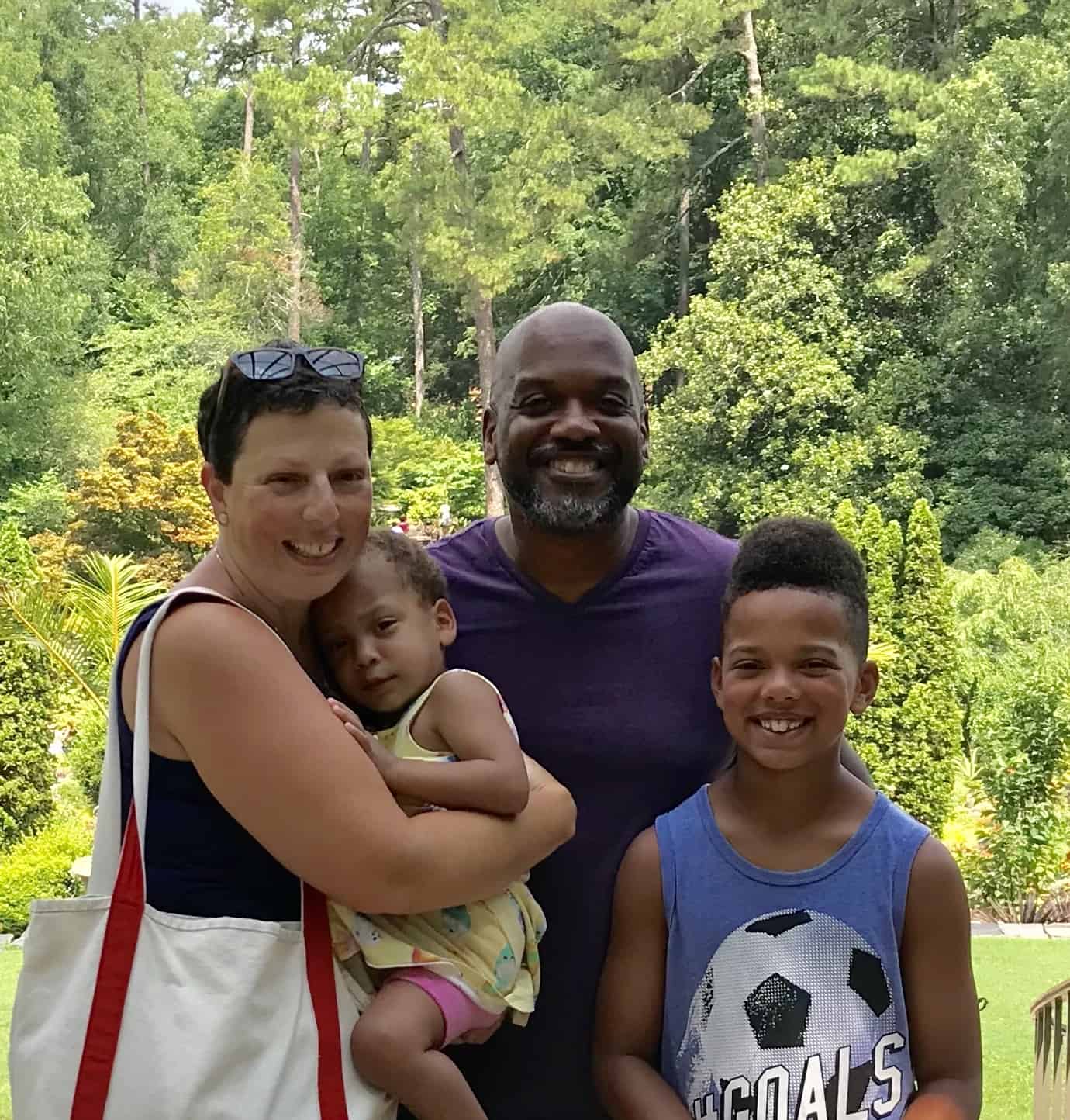by Sarah Katz
The recent murders of Ahmaud Arbery, Breonna Taylor, and George Floyd, along with the outpouring of public protest that has followed, have been a challenging time as a parent. How do we explain all of *this* to our children? I am white. My husband is Black. We are raising our two beautiful biracial children, ages 10.5 and 3.5, with a deep connection to their Jewish faith and heritage, and to their Black heritage.
Conversations about racism and police violence toward Black and Brown bodies are not new in our household. In reality, it is a shared commitment to antiracism and social justice work that drew my husband and I together almost 18 years ago when we were law students. My husband is a freelance writer who often writes about race and the criminal justice system. I am a public interest lawyer and law professor. We have been having versions of “the talk” (about how to handle an encounter with law enforcement) with our 10.5-year-old son for several years now. I worry every day about how to keep my husband and children physically and emotionally safe from racism and white supremacy. There has been a lot of attention in the last several weeks on the need for white people to engage in the ongoing work of antiracism. It feels like the whole (white) world just woke up and realized what we have known and lived as truth for a long time.
Jews and Jewish institutions also need to engage in the work of dismantling the vestiges of white supremacy. The Jewish people are beautifully diverse, and are approximately 12 to 15 percent of color. As Rabbi Sandra Lawson recently painfully wrote, “as a black Jew, I regularly experience racism in Jewish spaces.” This should be a call to action to every white Jew to dig deep into the work of antiracism.
In my years as a parent, I have found that other parents often ask my advice about how to handle conversations with their children about race and racism, assuming I have expertise because I am married to a Black man and raising biracial children. My choice of a spouse does not make me an expert, and I still personally have a lot of work to do in unpacking and dismantling the vestiges of white supremacy with which I was raised. But here are a few points I would like you to know about my multiracial Jewish family.
- My Family is Jewish. My husband and I agreed from the beginning that we would have a Jewish household and raise Jewish children. We joined our wonderful synagogue, Mishkan Shalom, in August 2005, just a month after we got engaged. Our children are growing up deeply aware of their Jewish identity and faith. And yet we have had many experiences as a family in Jewish spaces where my husband and/or children have been assumed not to be Jewish. Asking whether my husband converted, or assuming my older son doesn’t know a Hebrew blessing or song, makes our family feel unwelcome.
- My husband and children are Black. My husband and children’s brown skin means that they have unique safety needs. After the mass shooting at the Tree of Life synagogue in Pittsburgh, many synagogues and Jewish institutions increased security measures and coordination with law enforcement. As the public execution of George Floyd underscores, increased police presence does not guarantee the safety of Black and Brown people. Jewish institutions need to carefully weigh how to ensure the physical and emotional safety of all Jews in their communities.
- Antiracism is ALL of our responsibility. As Jews, we all share a duty of tikkun olam, repairing the world. Doing the work of antiracism is not uniquely my responsibility, or the responsibility of my Black family members. Jews’ history and experiences with antisemitism sometimes lead to “oppression Olympics” where Jews assume they cannot be racist because of their own history of oppression. For white Jews, our Jewish identity does not exempt us from internalizing white supremacy, nor from the ongoing responsibility to do the work of antiracism.
- Actions Speak Louder Than Words. The recent weeks of protests have created a clarion call for institutions of all kinds to “do something.” In recent weeks, my husband has received several invitations to speak to Jewish groups about antiracism efforts. The “something” needs to be more than a temporary action like issuing a statement of solidarity or holding an event. The work of antiracism requires a shift in mission and values, and ongoing action. Black and Brown voices should center these action efforts, while at the same time all the work should not fall to Black and Brown people – racism and white supremacy are white people’s problems to fix. It is this ongoing action which will go a long way to ensuring my family and other Jews of color feel consistently welcome and safe.
- Culture shift is hard work. Neither institutions nor people can become antiracist overnight. Despite your best intentions, you will continue to say and do things that cause harm to the Black and Brown Jews (and non-Jews) in your community. And when a Black or Brown person puts in the time and emotional labor to point out the harm, try not to become defensive (very hard I know! Its our first instinct to fight back with ‘I’m not racist!’). This work is hard, this work is messy. You won’t always get it right – personally, I certainly have not. But it’s only by continuing to try to do right that we will realize a vision of a Jewish community (and a world) that is welcoming for all.
Sarah Katz is a Philadelphia-based mom and lawyer/clinical law professor. She lives with her family in Fairmount and is a member of Mishkan Shalom.




